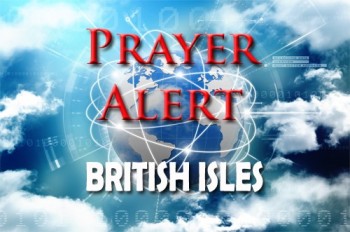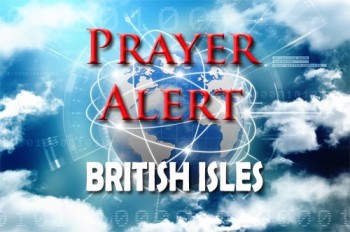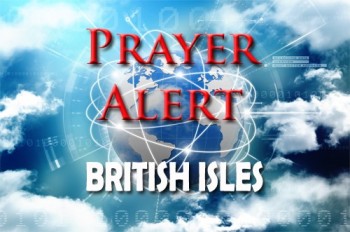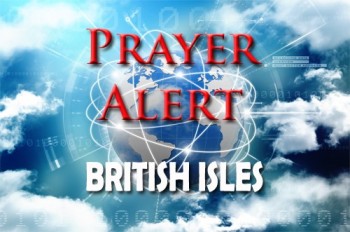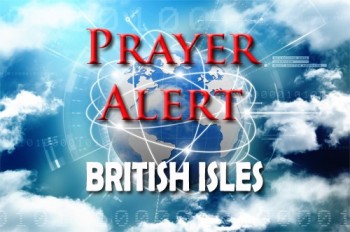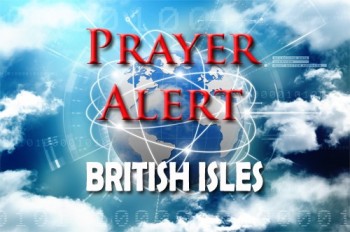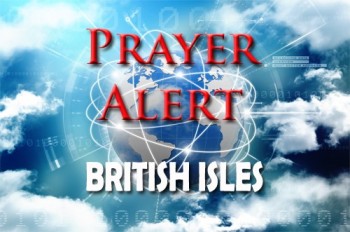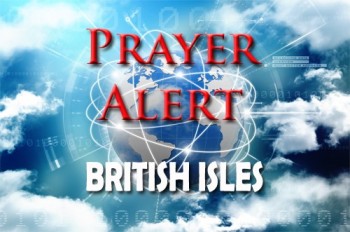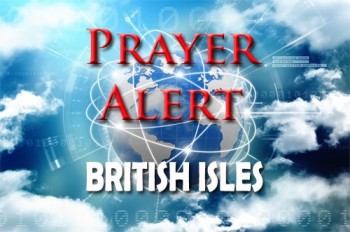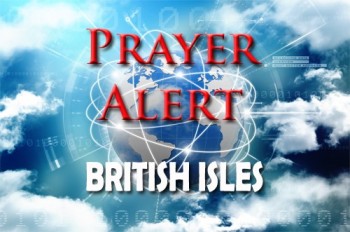Displaying items by tag: United Kingdom
Outreach: Trypraying
Trypraying is for the non-religious who don’t do church. Trypraying banners are appearing on buses, billboards and buildings. Some fly on a wind farm in Scotland, on the turnstiles of a railway station and one was on the route of the Tour de Yorkshire. Why? People pray when they see them, and it opens up conversations around faith. 400+ churches are currently using Trypraying across the UK and 40,000 booklets were printed and shipped to the USA, with 10,000 children's booklets and 10,000 youth booklets. A Spanish edition is coming soon. Churches are using Trypraying, as is a whole diocese in Leicestershire! Other churches are joining it with 'Thy Kingdom Come'. How does it work? Each person in a congregation thinks of and prays for a person, and then they give that person a Trypraying booklet to use and then hand on to someone else.
Outreach: Day of the Christian Martyr (29 June)
According to church tradition, 29 June marks the martyrdom of the Apostle Paul. This year, Christians around the world will take time on that day and throughout that weekend to honour the legacy of those who have sacrificed their lives for the advancement of the gospel. Churches are invited to register and receive links to download free digital resources to inspire congregations, small groups, classes and families to witness boldly for Christ.
Former magistrate challenges government
In 2016 Richard Page was sacked as a magistrate and lost his position as a non-executive director at an NHS trust, after saying that it was best for adopted children to be placed in families headed by a mother and father. His barrister has now told an appeal tribunal that judges should not be removed because of political pressures.The case represents a watershed moment in this nation’s history. The tribunal is tasked with ruling on whether HM Courts and Tribunal Service (the symbol of justice and fairness in our nation) can dismiss someone for holding and expressing Christian beliefs - sincere beliefs demonstrable through social science, biology and psychology. Pray for Richard and his family as they cope with this long-drawn-out situation. See also
British Steel collapse
As the Government looks for a new owner for British Steel, Liberty Steel has been flagged as a potential buyer, with a clear interest in the Scunthorpe plant. At present 5,000 jobs are at risk: 3,000 at Scunthorpe, another 800 in north-eastern England, and the rest in various sites around the world. The workers’ wages this week have been paid, and the Government will pick up the bill from now on. Pray for the workforce, in Scunthorpe and elsewhere, now in shock; for the families with mortgages on their homes not knowing where their next paycheck will come from; and for local shop owners who rely on steelworkers for their income. Pray for vision, skill, and wise investment in the British steel industry, enabling it to flourish and for jobs to be retained. See
Another call to review relationships and sex education
RSE (relationships and sex education) is a contentious issue. Several schools in Birmingham recently suspended the teaching of an LGBT+ inclusive programme, No Outsiders, after protests from parents. Stephen Fry and others wrote to the education secretary saying that political, religious and cultural sensitivities should not be allowed to thwart mandatory age-appropriate RSE from the first year of primary education. The signatories say that lessons should be LGBT+ inclusive and ‘inform older pupils about sexual pleasure for LGBT and how to achieve it for themselves and a partner’. They call for statutory enforcement of even more explicit teaching about sex; for further normalisation and promotion of homosexual behaviours and that same-sex, homosexual, and bisexual relations must be presented as equally valid, with no faith school opt out, or parental right of withdrawal. They said, ‘Our goal is to ensure that pupils leave school emotionally and sexually literate and able to enjoy fulfilling, caring and enduring relationships.’
Vulnerable people in secure units
Up to fifty patients who should be released, some with learning disabilities and autism, are stuck in secure units run by mental health hospital charities. St Andrew's Healthcare treats up to 900 patients with severe mental health and learning difficulties. 90% of referrals are from the NHS and need specialist care. However there is a lack of suitable community places, so seclusion is the emergency response. Seclusion rooms are bare, with a hatch in the door for patients to receive food and have physical contact. BBC TV footage showed a teenager locked in seclusion, able to touch their parent only through a door hatch. Patients are supposed to be admitted to these units for nine to 18 months, but the average stay nationally is five years. One patient was detained an extra 524 days after they should have been released.
Warning against Islamophobia definition
Over forty representatives from a wide range of religious and non-religious backgrounds have written an open letter to the Home Secretary, warning against adopting a proposed definition of Islamophobia. They say the definition is ‘deeply problematic’ and ‘flawed’, and that officially adopting it could create ‘a backdoor blasphemy law’, restricting anyone from legitimately criticising Islamic beliefs or practices. Yet it has already been adopted by several political parties and local councils. One signatory, Tim Dieppe of Christian Concern, said, ‘The problem with the term “Islamophobia” is that it inevitably conflates the religion with the people. It may be that attempting to define this term in ways that will not restrict free speech turns out to be extremely difficult, if not impossible.’
52 migrants rescued in Channel
Border Force officials intercepted four flimsy dinghies carrying 52 Iranian and Iraqi men, women and children journeying from northern France to the Kent coast. The people-smuggling gangs make thousands of pounds from sending refugees across the world’s busiest shipping lane. Concerns are likely to be raised that the Home Office’s decision to deploy cutters encourages migrants to travel in the belief they will be rescued and brought to the UK. Experts believe the number of arrivals will increase in the next few months as the weather improves. All the migrants were handed over to immigration officials to be processed, fed, given medical attention and undergo security screening. Meanwhile eight men and a child suffering from hypothermia were stopped in French waters and taken back to France. See
Prayers in and for Parliament
Bishop Graham Tomlin wrote in the Sunday Times, ‘Prayer reminds me that my opponents are people too, that they deserve respect even if I think they are profoundly wrong. We need our politicians to pray because we need them to know that they are not God, that whatever power they have is borrowed. They need to treat each other well, debate wisely and carefully, and know they are accountable not just to us and our passing fads, but to something bigger, deeper and more final - a God whose Kingdom will last long after Brexit is a footnote in the books of history.’ We can pray for all struggling to break the Brexit deadlock to find time to attend Parliament church services this term. See
Organised crime at record level
‘The changing nature of organised crime is undermining the UK’s economy, integrity, infrastructure and institutions,’ says the National Crime Agency. ‘Britain risks losing the fight against crime unless the police receive significant new resources to tackle chronic and corrosive threats from criminal groups.’ In a chilling assessment, it says the threat from organised crime groups is at unprecedented levels and kills more citizens every year than terrorism, war and natural disasters combined. This rare political intervention reopened the debate on police funding: without significant investment the UK’s forces will fall further behind the criminals exploiting encrypted communications technology and dark web anonymity. Last year Whitehall’s spending watchdog revealed that the jobs of 44,000 police officers and staff had been lost since 2010. In 2019 transnational criminal networks, the exploitation of technological improvements and ‘old-style violence’ is allowing serious crime gangs to dominate communities.
